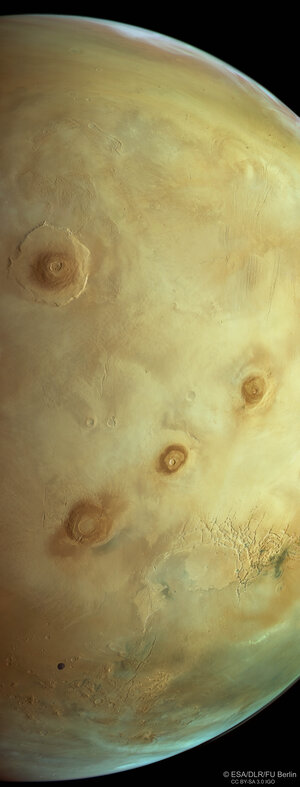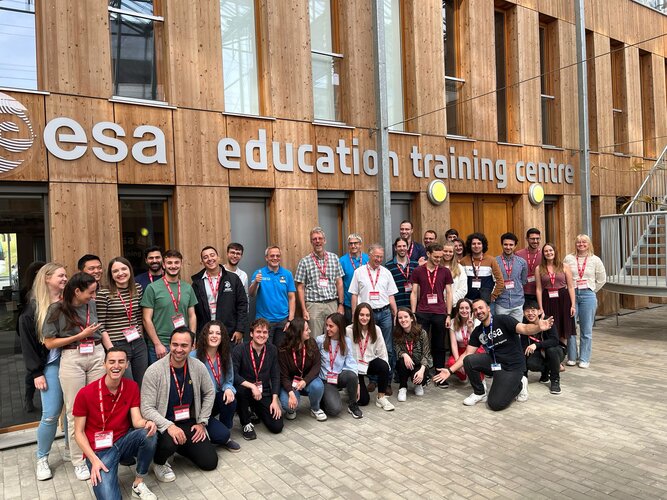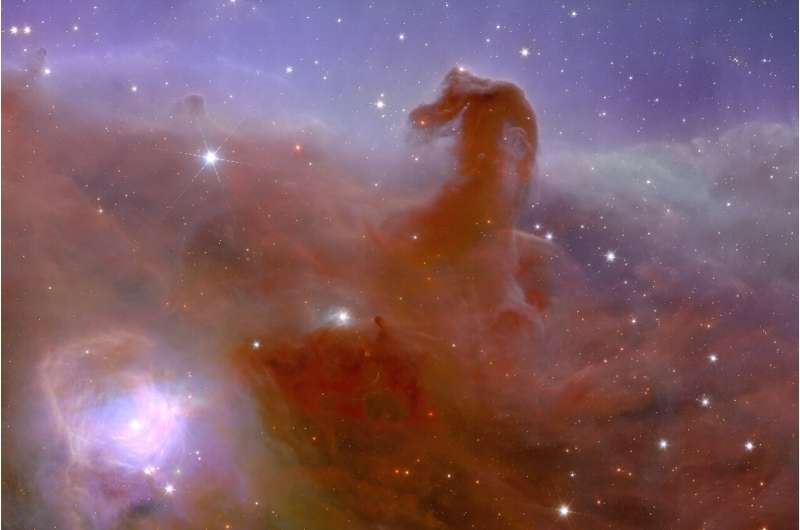Mars Express celebrates 25 000 orbits
Wednesday, 27 March 2024 09:00
ESA’s Mars Express recently looped around Mars for the 25 000th time – and the orbiter has captured yet another spectacular view of the Red Planet to mark the occasion.
Navigation Training Course now open for application
Wednesday, 27 March 2024 08:01
ESA Academy is calling on university students to apply for the Navigation Training Course to be held from 24 to 28 June 2024 at ESA Academy’s Training and Learning Facility in ESEC-Galaxia, Belgium. This Training Course is a collaboration between ESA Education and ESA’s Directorate of Navigation. Would you like to know more about the future of satellite navigation? Apply for our course today!
Vegetation gets a boost with data from space
Wednesday, 27 March 2024 07:40
When it comes to predicting what our climate will be like in the future, vegetation matters. Plants and trees exert a powerful influence over both the energy cycle and the water cycle. And, crucially, it is estimated that vegetation draws down well over three billion tonnes of carbon from the atmosphere each year – this is equivalent to a third of greenhouse-gas emissions from human activity.
Accounting for vegetation growth is clearly important in the complex climate puzzle – and the release of a new satellite dataset is set to help climate modellers with the
Astrobotic hires space industry veterans to help with Griffin lander
Tuesday, 26 March 2024 22:08

Early Adopters of NASA's PACE Data to Study Air Quality, Ocean Health
Tuesday, 26 March 2024 21:04 From the atmosphere down to the surface of the ocean, data from NASA's PACE (Plankton, Aerosol, Cloud, ocean Ecosystem) satellite benefits ecosystems, human health, and underrepresented communities.
Years before the launch in February 2024, mission leaders from NASA teamed with dozens of applied scientists and environmental professionals to prepare for the many practical uses that could be
From the atmosphere down to the surface of the ocean, data from NASA's PACE (Plankton, Aerosol, Cloud, ocean Ecosystem) satellite benefits ecosystems, human health, and underrepresented communities.
Years before the launch in February 2024, mission leaders from NASA teamed with dozens of applied scientists and environmental professionals to prepare for the many practical uses that could be Japan attempts to revive Moon lander after second lunar night
Tuesday, 26 March 2024 21:04 Japan's space agency said on Tuesday it will try to revive its Moon lander after a second frigid, two-week lunar night, following a surprising awakening last month.
The unmanned Smart Lander for Investigating Moon (SLIM) touched down in January at a wonky angle that left its solar panels facing the wrong way.
As the sun's angle shifted, it came back to life for two days and carried out s
Japan's space agency said on Tuesday it will try to revive its Moon lander after a second frigid, two-week lunar night, following a surprising awakening last month.
The unmanned Smart Lander for Investigating Moon (SLIM) touched down in January at a wonky angle that left its solar panels facing the wrong way.
As the sun's angle shifted, it came back to life for two days and carried out s China elevates atmospheric and space onitoring capabilities with new satellite
Tuesday, 26 March 2024 21:04 On Thursday afternoon, the China Aerospace Science and Technology Corporation announced the successful launch of a Long March 2D carrier rocket from the Jiuquan Satellite Launch Center. This launch marked the deployment of the second batch of Yunhai 2-series satellites into orbit, further bolstering China's capabilities in atmospheric monitoring and space environment observation.
The satel
On Thursday afternoon, the China Aerospace Science and Technology Corporation announced the successful launch of a Long March 2D carrier rocket from the Jiuquan Satellite Launch Center. This launch marked the deployment of the second batch of Yunhai 2-series satellites into orbit, further bolstering China's capabilities in atmospheric monitoring and space environment observation.
The satel Aireon and Airbus Enhance Partnership to Distribute Space-Based ADS-B Data to Wider Audience
Tuesday, 26 March 2024 21:04 Aireon has broadened its partnership with Airbus through an expanded distribution deal, facilitating greater accessibility to its cutting-edge space-based automatic dependent surveillance-broadcast (ADS-B) data. This strategic move will see Airbus incorporating Aireon's comprehensive ADS-B data into its suite of advanced flight analytics and digital solutions, offering unprecedented benefits to
Aireon has broadened its partnership with Airbus through an expanded distribution deal, facilitating greater accessibility to its cutting-edge space-based automatic dependent surveillance-broadcast (ADS-B) data. This strategic move will see Airbus incorporating Aireon's comprehensive ADS-B data into its suite of advanced flight analytics and digital solutions, offering unprecedented benefits to Penn State's Satellite Technique Predicts Severe Storm Impact
Tuesday, 26 March 2024 21:04 A new technique developed by researchers at Penn State, leveraging satellite data, has shown promise in enhancing the accuracy of severe weather forecasts. This method, which integrates microwave data from low-Earth-orbit satellites into conventional computer weather models, has successfully predicted the intensity and location of surface gusts during the severe Midwest Derecho of 2020.
Yu
A new technique developed by researchers at Penn State, leveraging satellite data, has shown promise in enhancing the accuracy of severe weather forecasts. This method, which integrates microwave data from low-Earth-orbit satellites into conventional computer weather models, has successfully predicted the intensity and location of surface gusts during the severe Midwest Derecho of 2020.
Yu New Study Unveils Inadequacies in Traditional Theories of Van Allen Belts
Tuesday, 26 March 2024 21:04 A new study spearheaded by the University of Birmingham has thrown a challenge at the space science community to deepen our understanding of the hazardous zones close to Earth, known as the Van Allen Belts. This research marks a major advance towards evolving new theories and methodologies capable of predicting and analyzing the dynamics of space particles more accurately.
Historically, th
A new study spearheaded by the University of Birmingham has thrown a challenge at the space science community to deepen our understanding of the hazardous zones close to Earth, known as the Van Allen Belts. This research marks a major advance towards evolving new theories and methodologies capable of predicting and analyzing the dynamics of space particles more accurately.
Historically, th BurstCube: NASA's Compact Satellite Takes on the Cosmos' Most Explosive Mysteries
Tuesday, 26 March 2024 21:04 In a significant step toward unlocking the universe's most explosive phenomena, NASA's BurstCube has embarked on its journey to the International Space Station. This compact, shoebox-sized satellite, aboard SpaceX's 30th Commercial Resupply Services mission, launched from Cape Canaveral Space Force Station, aims to explore short gamma-ray bursts - the universe's most intense explosions.
Af
In a significant step toward unlocking the universe's most explosive phenomena, NASA's BurstCube has embarked on its journey to the International Space Station. This compact, shoebox-sized satellite, aboard SpaceX's 30th Commercial Resupply Services mission, launched from Cape Canaveral Space Force Station, aims to explore short gamma-ray bursts - the universe's most intense explosions.
Af Connecting the Dots | Incoming illegal NGSO service crackdown
Tuesday, 26 March 2024 17:05

Europe space telescope's sight restored after de-icing procedure
Tuesday, 26 March 2024 16:30
The vision of the Euclid space telescope has been restored following a delicate operation that successfully melted a thin layer of ice that had been clouding its sight, the European Space Agency announced on Tuesday.
There had been fears that the creeping ice could delay the mission of Europe's space telescope, which blasted off in July on the world's first mission to investigate the cosmic mysteries of dark matter and dark energy.
However a de-icing procedure to gently warm up an optimal mirror on the telescope "performed significantly better than hoped", the ESA said.
"After the very first mirror was warmed by just 34 degrees, Euclid's sight was restored," it added.
In November, scientists on the ground noticed that they were losing a little light coming into the telescope's visible light imager.
They determined that the problem was a layer of ice—thought to be just the width of a strand of DNA—building up on the telescope's optical surfaces.





